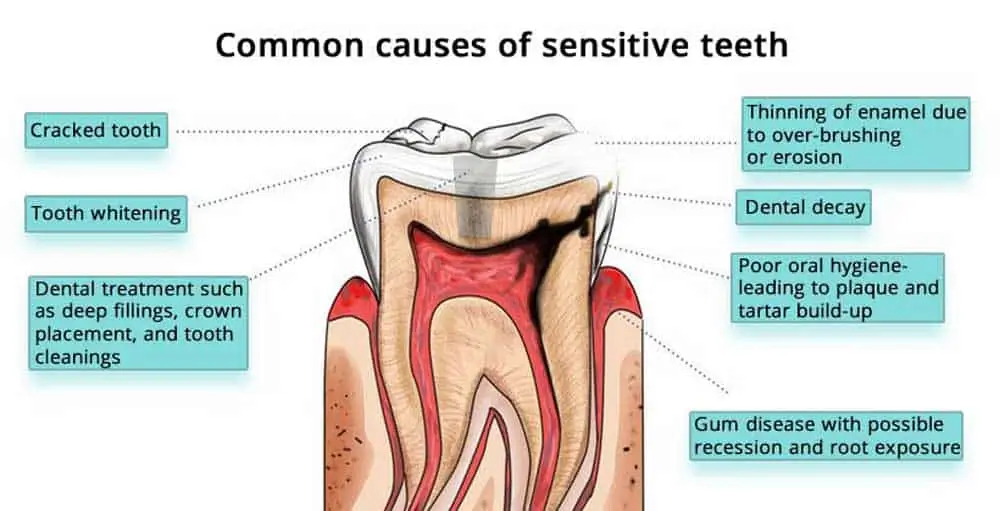Common Causes of Tooth Sensitivity and Ways to Treat It
Introduction
Tooth sensitivity is a common yet often debilitating condition that affects millions of people worldwide. It can cause significant discomfort when consuming hot, cold, or acidic foods and beverages, and can negatively impact overall quality of life. In this article, we examine the common causes and explore a variety of treatment options—from home remedies to advanced dental procedures—that help alleviate pain and protect your teeth.

Causes of Tooth Sensitivity

1. Enamel Erosion
The loss of tooth enamel is one of the primary causes of sensitivity. can occur due to aggressive brushing, frequent consumption of acidic foods and drinks, or exposure to abrasive substances, leaving the underlying dentin exposed.
2. Gum Recession
Gum recession exposes the tooth roots, which are not covered by enamel but by a much softer cementum. This exposure can lead to significant sensitivity, especially when the teeth come into contact with hot or cold substances.
3. Tooth Decay
Decay or cavities compromise the protective enamel and dentin, allowing external stimuli to reach the nerve endings in the tooth, resulting in pain and discomfort.
4. Dental Procedures
Recent dental work, such as fillings, crowns, or whitening treatments, can sometimes cause temporary sensitivity due to changes in the tooth structure or exposure of the dentin.
Signs and Symptoms
1. Sharp Pain When Eating or Drinking
The hallmark symptom is a sharp, sudden pain triggered by consuming hot, cold, or acidic foods and drinks.
2. Discomfort During Brushing
Sensitive teeth may react painfully to brushing or flossing, which can further exacerbate the condition if proper techniques are not followed.
3. Generalized Sensitivity
In some cases, can become chronic, affecting a wide range of stimuli and causing constant discomfort.
Treatment Options for Tooth Sensitivity
1. Home Remedies
Special Toothpastes for Sensitivity
Toothpastes formulated for sensitive teeth contain compounds that help block the transmission of pain signals from the tooth surface to the nerve. Regular use can gradually reduce sensitivity.
Saltwater Rinses
Rinsing with a warm saltwater solution can help soothe inflamed gums and reduce sensitivity by neutralizing acids in the mouth.
2. Professional Treatments
Fluoride Applications
Fluoride treatments help remineralize the enamel and reduce sensitivity. These treatments can be applied in the dental office and are often followed by the use of fluoride toothpaste at home.
Laser Therapy
Laser treatments are an innovative approach to treating tooth sensitivity. Lasers can seal the exposed dentinal tubules, thereby reducing sensitivity and protecting the tooth from further damage.
3. Restorative Procedures
Dental Bonding or Fillings
If sensitivity is caused by decay or minor cracks in the teeth, dental bonding or fillings may be used to cover the affected areas, thereby reducing sensitivity and restoring the tooth’s protective layer.
Gum Grafting
For patients with significant gum recession, gum grafting can cover exposed tooth roots, thereby reducing sensitivity and improving both function and aesthetics.
Preventive Tips
1. Improve Brushing Techniques
Using a soft-bristled toothbrush and gentle brushing techniques can help prevent enamel erosion. It is also important to replace your toothbrush every three months to ensure optimal effectiveness.
2. Modify Your Diet
Avoiding or limiting the intake of highly acidic foods and beverages can help protect your enamel. Drinking plenty of water and using a straw can also reduce direct contact with sensitive teeth.
3. Regular Dental Visits
Regular check-ups with your dentist are essential to monitor the condition of your teeth and address sensitivity issues early on before they develop into more serious problems.
Public Awareness and Education
1. Community Health Campaigns
Educational initiatives can help spread awareness about the causes and prevention of tooth sensitivity. Public health campaigns, both online and in the community, play an important role in encouraging good oral hygiene practices.
2. Professional Guidance
Dentists can provide personalized advice and treatment plans based on the severity and cause of the sensitivity, ensuring that each patient receives the best possible care.
Challenges and Future Research
1. Development of Advanced Sensitivity Products
Research is ongoing into developing new products that can more effectively block pain transmission and strengthen enamel, offering long-term relief for those suffering from chronic sensitivity.
2. Innovations in Regenerative Dentistry
New techniques in regenerative dentistry, including the use of stem cells and bioactive materials, hold promise for naturally restoring enamel and reducing
Conclusion
Tooth sensitivity is a manageable condition when addressed with proper preventive measures and timely treatment. By understanding the underlying causes—such as enamel erosion, gum recession, and decay—and by utilizing a combination of home remedies and professional treatments, patients can significantly reduce discomfort and protect their dental health. Consistent oral hygiene, dietary modifications, and regular dental check-ups are key to preventing sensitivity and maintaining a healthy, pain-free smile.
